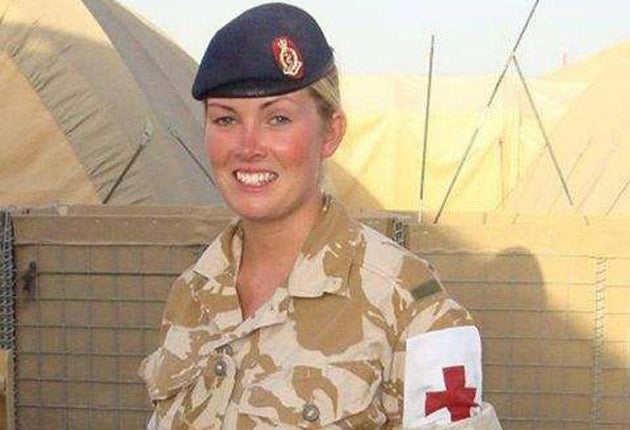Riddled with shrapnel, but still she saved seven comrades from Taliban
Army medic remained at scene of Afghan attack to treat injured soldiers

Your support helps us to tell the story
From reproductive rights to climate change to Big Tech, The Independent is on the ground when the story is developing. Whether it's investigating the financials of Elon Musk's pro-Trump PAC or producing our latest documentary, 'The A Word', which shines a light on the American women fighting for reproductive rights, we know how important it is to parse out the facts from the messaging.
At such a critical moment in US history, we need reporters on the ground. Your donation allows us to keep sending journalists to speak to both sides of the story.
The Independent is trusted by Americans across the entire political spectrum. And unlike many other quality news outlets, we choose not to lock Americans out of our reporting and analysis with paywalls. We believe quality journalism should be available to everyone, paid for by those who can afford it.
Your support makes all the difference.An Army medic ignored the shards of shrapnel embedded in her back to remain at the scene of a Taliban ambush in Afghanistan and treat seven injured comrades.
Lance Corporal Sally Clarke of 2nd Battalion, The Rifles, stayed in the firing line to help fellow soldiers including Corporal Paul Mather, who managed to radio jets circling above and instruct them to open fire on insurgents despite bleeding heavily from wounds the size of his fist.
L/Cpl Clarke, 22, from Cheltenham, Gloucestershire, was on patrol south of Sangin when insurgents fired rocket-propelled grenades over a wall as soldiers dealt with an anti-tank mine.
One grenade bounced off a soldier's rucksack, landing in the middle of the patrol and forcing them to dive for cover. After two explosions L/Cpl Clarke got up to find seven of her colleagues had been injured in the blasts – the most serious casualty suffering from extensive shrapnel wounds.
L/Cpl Clarke also had shrapnel wounds to her shoulder and lower back but defied the pain to set about treating the rest of her patrol.
She said: "I ran to the most seriously injured first. Cpl Mather had taken wounds to his left bicep and had very bad shrapnel wounds across the lower part of his body – one of the pieces had torn a fist-sized hole through his skin."
L/Cpl Clarke applied field dressings and a tourniquet, and then waited for the emergency response team to arrive. The medic, who has served in the forces for three years, treated each soldier before helping to move them to the helicopter landing site so that they could be flown to Camp Bastion.
Despite being entitled to get on the flight she refused, insisting she would not leave the rest of the patrol without a medic. She said: "I didn't feel like my injuries were bad enough to go back to the hospital, particularly as I was the only medic on the ground at the time.
"I couldn't leave them on their own – I came out here to support the troops on the ground and give them medical care when they need it the most."
An American A-10 aircraft and a British Apache helicopter provided close support to ward off the Taliban following the surprise attack in June.
They were aided in their task by Cpl Mather, the Forward Air Controller, who was even able to guide the aircraft from his stretcher.
L/Cpl Clarke, who stayed on the ground and accompanied the rest of the patrol back to their base, was later treated by a doctor at a medical aid post. She is due home within weeks to visit her parents, Chris and Rosemary Clarke, and friends.
Join our commenting forum
Join thought-provoking conversations, follow other Independent readers and see their replies
Comments